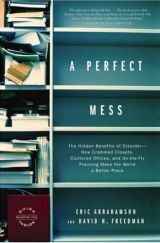


|
A Perfect Mess: The Hidden Benefits of Disorder - How Crammed Closets, Cluttered Offices, and On-the-Fly Planning Make the World a Better Place (平装)
by Eric Abrahamson, David H. Freedman
| Category:
Organizing, Personal effectiveness, Self help |
| Market price: ¥ 158.00
MSL price:
¥ 128.00
[ Shop incentives ]
|
| Stock:
Pre-order item, lead time 3-7 weeks upon payment [ COD term does not apply to pre-order items ] |
MSL rating:
 Good for Gifts Good for Gifts |
| MSL Pointer Review:
If you're ever feeling depressed because your life is a mess, open this book to any page and you will be uplifted by an anecdote illustrating how often it is that turmoil magically leads to good fortune. |
| If you want us to help you with the right titles you're looking for, or to make reading recommendations based on your needs, please contact our consultants. |

|
| |
AllReviews |
1 Total 1 pages 5 items |
|
|
Fast Company, USA
<2008-07-12 00:00>
A compelling and comical tour of humanity's guilt-ridden love affair with accidents, messes, and randomness... Combine the world-is-not-as-it-seems mindset of Freakonomics with the delicious celebration of popular culture found in Everything Bad Is Good for You to get the cocktail-party-chatter-ready anecdotes of 'messiness leading to genius' in A PERFECT MESS. |
|
|
Observer, UK
<2008-07-12 00:00>
Timely reassurance to those of us who fear and despise pristine houses, perfect schedules and neat-freakery of every stripe. |
|
|
Sunday Telegraph, UK
<2008-07-12 00:00>
... provocative and often amusing... Eric Abrahamson and David Freedman's thesis will come as a relief to many. |
|
|
Guardian, UK
<2008-07-12 00:00>
... this engaging and surprisingly well-ordered book... is the perfect excuse to break that new year's resolution to keep your desk tidy. |
|
|
A guest reviewer, USA
<2008-07-12 00:00>
The premise of the book seems to be that most of us cherish neatness and organization more than we should. We buy lots of organizational products, make endless lists, and fret about what the neighbors would think if they could see into the closets. The authors suggest that disorganization (or at least not rigidly imposed organization) has lots of unexpected payoffs in terms of time-savings, unsuspected synergies, and the joy of sheer discovery. Case in point - Pencillin was invented largely because the researcher hadn't cleaned out the petri dishes before going on vacation.
I'm amused, however, when I compare the book's thesis to its actual structure. The authors lay out their premise chapter-by-chapter, beginning with an overview of their goals, progressing through a number of examples in a variety of contexts, and ultimately reaching a conclusion. The book also contains an index that closely links each concept and topic to the specific page where a reader can find it.
If the book applied the same premises that it advocates, it wouldn't begin somewhere in the middle, place the examples and case studies in somewhat random order, and not reach a conclusion because that's something that the reader will discover in the course of non-directed perusal. Naturally, the authors felt they couldn't practice what they preach if they hoped to sell many copies...
I liked the book a lot. It provides some much-needed ammunition to counter the Martha Stewarts of the world and suggests that almost everyone can be more flexible in how he receives and processes information. But I'm going to take the book for what it's worth - while still continuing to make to-do lists. |
|
|
|
1 Total 1 pages 5 items |
|
|
|
|
|
|